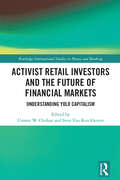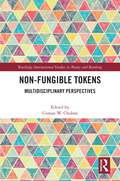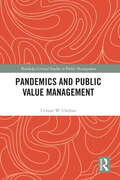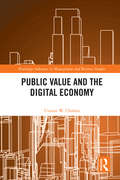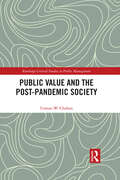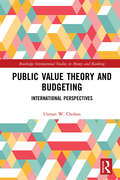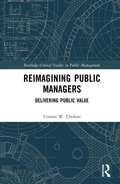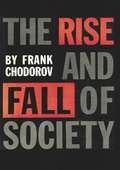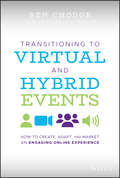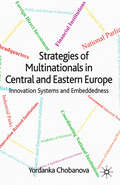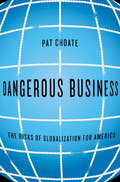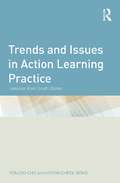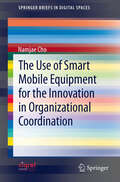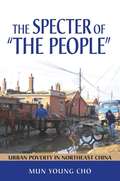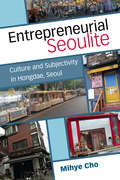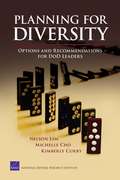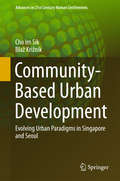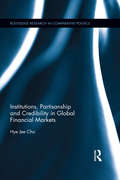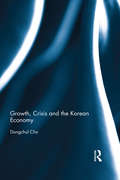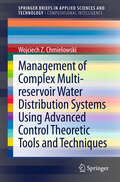- Table View
- List View
Activist Retail Investors and the Future of Financial Markets: Understanding YOLO Capitalism (Routledge International Studies in Money and Banking)
by Usman W. Chohan Sven Van KerckhovenContemporary financial markets have been characterized by sociocultural phenomena such as "meme stocks", the Gamestop short squeeze, and "You Only Live Once (YOLO) trading". These are movements led by small-scale retail investors banding together to participate forcefully in financial markets through decentralized but coordinated actions. This book deploys many different subdisciplines to explore the recent ‘power grabbing’ of retail investors and the online environment that enables them to join the ranks of major financial players, and participate in contemporary capitalism. It offers multiple perspectives on the genesis, role, motivations, power, and future prospects of retail investors as a force in contemporary financial markets. Drawing upon the insights of authors hailing from many different countries, the book frames YOLO capitalism through numerous angles that help to explain the context and the importance of activist retail investors in modern financial markets, and thereby explore the possibilities of a transformed financial future with much wider small-scale participation. The book assesses the potential of online - and other - communities in enabling global coordination in impacting or even driving financial and crypto markets, and the challenges that come with it and weighs the competing narratives both positive and negative regarding YOLO capitalism. It strikes a balanced assessment of their legal, cultural, behavioural, economic, and political roles in modern finance. This book will be of interest to a multidisciplinary and interdisciplinary audience of scholars in financial markets, financial regulation, political economy, public administration, macroeconomics, corporate governance, and the philosophy and the sociology of finance.
Non-Fungible Tokens: Multidisciplinary Perspectives (Routledge International Studies in Money and Banking)
by Usman W. ChohanNon-Fungible Tokens (NFTs) have blossomed into an area of immense cultural, investment, and academic interest, and this groundswell of fascination with non-fungible digital tokenization has been accompanied by a variety of attitudes towards their function, purpose, and potential. Some advocates perceive NFTs to be revolutionary in character, reshaping notions of the construction and preservation of unique assets in the digital realm. At the same time, a notable number of skeptics and detractors view the NFT movement as a passing and overhyped fad at best, and a disingenuous ploy in the digital economy at its worst. Given the diversity of views that have emerged in a comparatively brief span, this book draws upon rich academic perspectives on NFTs from a variety of disciplines, including: computer science, cultural studies, mathematics, sociology, linguistics, mass communication, economics, and finance.The book teases out nuances in how NFTs can and should operate, while also pointing to the potential that these non-fungible assets wield in the digital sphere, along with countervailing arguments against their conceptual and functional salience, and perhaps some dangers that they pose. The book considers the longevity and viability of NFTs as sociocultural, technological, and economic phenomenon, while offering estimates of future paths that NFTs might take in each domain and weighs the opposing narratives and strikes balanced assessments of the legal, cultural, technological, economic, and political role of NFTs in modern society.With its panoramic display of analysis on NFTs, the book will be of particular interest to scholars and researchers across a wide number of subjects.
Pandemics and Public Value Management (Routledge Critical Studies in Public Management)
by Usman W. ChohanWidespread crisis-events such as pandemics can impose an immense strain on societies’ multi-stakeholder efforts to preserve and sustain the mechanisms of public value (PV) creation. The global coronavirus (Covid-19) pandemic exemplifies this because it has pushed civil society, public managers, politicians, and society-at-large into uncharted waters, and at times brought them under exceptional duress. Then how can public value’s agents attempt to conceive, create, and preserve value under such disruptive circumstances? How could public value theory’s (PVT’s) theoretical precepts be informed by the pandemic? This book seeks to inform the PVT literature by drawing upon interesting lenses that have emerged in the wake of the coronavirus pandemic. It addresses PVT’s notions of value conflicts, post-Truth politics, multilateral PV, nationalism and the public, comparative PV creation, and PV in developing-country contexts, in order to construct a multi-stakeholder and internationally informed set of analyses on public value’s systems and agents in uniquely distressing circumstances such as pandemics. This book will therefore be of use to both academics and practitioners of public administration and public policy, as well as scholars of government, healthcare policy, and economics.
Public Value and the Digital Economy (Routledge Advances in Management and Business Studies)
by Usman W. ChohanHow can the public manager create and co-create value in the digital economy? While there is much exciting work being done, there is a pressing need to recontextualize public value theory (PVT), specifically in terms of its theoretical precepts, in the fluid and dynamic environment that the digital economy has produced. Much of the theoretical undergirding of PVT predates the full onset of today’s digital economy, leaving aside phenomena including citizen-driven innovations, decentralized digital structures, and the algorithmic foundations of new economic life. This is why a conceptually driven exercise in contemporizing PVT would be of great value to public administration’s theoreticians seeking to lead the theory in catching up to the praxis. This book seeks to answer the question of creating and co-creating public managerial value by presenting chapters that revisit categories central to the functions of public managers in relation to other value-creating agents under PVT. It introduces new and important lenses to PVT that are grounded in the praxis of the digital economy, raising new questions about old problems in PVT and generating newer formulations that push PVT forward and make its debates salient to the futures that lay before the modern public manager. The book therefore constitutes an important effort to take PVT forward by shedding new light on the potency of the public manager in confronting and constructing the digital economy through co-creation with the other agents of public value. It will be of interest to researchers, academics, and policy makers in the fields of public and nonprofit management, public administration and policy, and PVT.
Public Value and the Post-Pandemic Society (Routledge Critical Studies in Public Management)
by Usman W. ChohanThe destruction of the Covid-19 pandemic has marked every society with deep-seated wounds whose scars have only begun to heal. Yet, even as societies take their first steps away from the trauma of the pandemic, they confront new and perhaps equally daunting challenges in the post-Covid era. These challenges offer a unique occasion to consider how the mechanisms of public value (PV) creation and preservation can be rebuilt and improved, mindful of what has been left in the pandemic’s wake, and of the difficult road that lies ahead. The aim of this book, then, is to examine the forward-looking possibilities of multi-stakeholder value co-creation, which involves the renewed efforts of civil society, public managers, politicians, and society-at-large in a new post-pandemic era. The book examines many different facets that appeal deeply to public value scholarship: value stability & transitions, inequalities within & between publics, necropolitics, disaster preparedness, value measurement, and sustainability, all of which represent important explorations within public value theory, and can greatly enrich PV research going forward. This book will therefore be of use to both academics and practitioners of public administration and public policy, as well as scholars of government, health care policy, and economics.
Public Value Theory and Budgeting: International Perspectives (Routledge International Studies in Money and Banking)
by Usman W. ChohanPublic value theory has advanced over the past 30 years, but there is a need to extend its boundary outwards into new contexts and update its discourse to reflect new social challenges. We are now trying to create value in a globalized world, with supranational entities, with new international alliances and institutions, in a frightening post-truth era. How can public managers grapple with these emerging realities? This book seeks to provide answers to such public value questions by applying powerful budgeting perspectives. Using case studies of independent budget offices, key fiscal instruments, and leading public value frameworks, this book stands out in its use of budgetary lenses to answer pertinent questions about the multidimensional processes of value creation by and for a wider society. Pushing the debate on public value forward and taking it onto the global stage, the book asks whether public value (and other public administration theories) are applicable beyond the traditional context of the pro-globalization Western liberal democracies in which they were conceived. It does this by exploring the realms of developing countries, supranational entities, and post-Communist societies, among others. Finally, it presents these explorations in light of very recent sociopolitical trends and phenomena, including the growth of civil society, the global financial crisis, the illiberal democracy, and the post-truth era. Tailored to an audience comprising public administration scholars, students of government, budget practitioners, and social scientists interested in contemporary problems of values in society, this book helps to advance public administration thought by extending public value theory into new contexts and relating it to the growing global challenges of public life.
Reimagining Public Managers: Delivering Public Value (Routledge Critical Studies in Public Management)
by Usman W. ChohanPublic value theory speaks to the co-creation of value between politicians, citizens, and public managers, with a focus on the public manager in terms of her contributions, initiatives, and limitations in value creation. But just who are public managers? Public value regularly treats the "public manager" as synonymous with bureaucrat, government official, civil servant, or public administrator. However, the categories of public managers represent a more versatile and expansive set of agents in society than they are given credit for, and the discourse of public value has typically not delved sufficiently into the variety of possible cadres that might comprise the "public manager." This book seeks to go beyond the assumed understandings of who the public manager is and what she does. It does so by examining the processes of value creation that are driven by non-traditional sets of public managers, which include the judiciary, the armed forces, multilateral institutions, and central banks. It applies public value tools to understand their value creation and uses their unique attributes to inform our understanding of public value theory. Tailored to an audience comprising public administration scholars, students of government, public officials, practitioners, and social scientists interested in contemporary problems of values in society, this book helps to advance public administration thought by re-examining the theory’s ultimate protagonist: the public manager. It therefore constitutes an important effort to take public value theory forward by going "beyond" conceptions of the public manager as she has thus far been understood.
The Rise And Fall Of Society: An Essay On The Economic Forces That Underlie Social Institutions
by Frank ChodorovFrank Chodorov adored the work of Albert Jay Nock, particularly Nock's writings on the State, and so Chodorov set out to rework Nock's book in his own style--with this book being the result.It describes in detail the difference between the "State" and "Society" and highlights issues current to this day, such as high tax, high spend and loss of freedom. The book illustrates the formation of a society, its government, and the eventual dismantling of society by governing political bodies.Rothbard wrote of this book: "Frank's final flowering was his last ideological testament, the brilliantly written The Rise and Fall of Society, published in 1959, at the age of 72."
Transitioning to Virtual and Hybrid Events: How to Create, Adapt, and Market an Engaging Online Experience
by Ben ChodorCreating virtual events is not as simple as moving the same content online — learn how to immediately leverage virtual solutions for effective in-person online events As the global COVID-19 pandemic continues to have unprecedented impact on both the global economy and the whole of the world population, the need for effectively and efficiently connecting people and the right information has never been more urgent. Although the technology infrastructure currently exists, many organizations are scrambling to create virtual meetings and events to address important time-sensitive issues. Transitioning to Virtual and Hybrid Events explains everything an event host needs to know about going virtual, from understanding the new audience, to adapting content to the new medium, to marketing effectively, and much more. Author Ben Chodor, president of Intrado Digital Media, provides expert advice and real-world instructions for delivering engaging hybrid, virtual, and streaming events and webinars for companies of all sizes and across all industries. Packed with detailed tutorials, real-world case studies, illustrative examples, and highly useful checklists, this comprehensive resource provides step-by-step guidance on: Planning, creating, and implementing a digital event Choosing between a stream, a webcast, or a hybrid event Evaluating different technological solutions Producing compelling virtual content for a variety of scenarios Effectively promoting online events Meeting the needs of a diverse and global audience Transitioning to Virtual and Hybrid Events is an indispensable instruction manual for anyone tasked with enhancing their organization’s continuity plans, enabling their employee base to work remotely, or creating any type of virtual solution to meet this urgent crisis.
Collaborative Financial Infrastructure Protection: Tools, Abstractions, and Middleware
by Gregory Chockler Roberto BaldoniThe Critical Infrastructure Protection Survey recently released by Symantec found that 53% of interviewed IT security experts from international companies experienced at least ten cyber attacks in the last five years, and financial institutions were often subject to some of the most sophisticated and large-scale cyber attacks and frauds. The book by Baldoni and Chockler analyzes the structure of software infrastructures found in the financial domain, their vulnerabilities to cyber attacks and the existing protection mechanisms. It then shows the advantages of sharing information among financial players in order to detect and quickly react to cyber attacks. Various aspects associated with information sharing are investigated from the organizational, cultural and legislative perspectives. The presentation is organized in two parts: Part I explores general issues associated with information sharing in the financial sector and is intended to set the stage for the vertical IT middleware solution proposed in Part II. Nonetheless, it is self-contained and details a survey of various types of critical infrastructure along with their vulnerability analysis, which has not yet appeared in a textbook-style publication elsewhere. Part II then presents the CoMiFin middleware for collaborative protection of the financial infrastructure. The material is presented in an accessible style and does not require specific prerequisites. It appeals to both researchers in the areas of security, distributed systems, and event processing working on new protection mechanisms, and practitioners looking for a state-of-the-art middleware technology to enhance the security of their critical infrastructures in e.g. banking, military, and other highly sensitive applications. The latter group will especially appreciate the concrete usage scenarios included.
Strategies of Multinationals in Central and Eastern Europe
by Yordanka ChobanovaThe focus of the study is on the larger food processing companies, which invested in Central and Eastern Europe - namely Nestl#65533;, Unilever and InBev - and analyses the motives of investment and the entry strategies of food MNEs, outlines their contribution to the local development and stresses the national actors as forces to embedded FDI.
Dangerous Business: The Risks of Globalization for America
by Pat ChoateFrom one of the most respected and vigorous economic thinkers in Washington, D. C. , comes a wake-up call about the perils of unfettered globalization. Choate presents politically viable steps the U. S. can take to remain prosperous and secure.
Trends and Issues in Action Learning Practice: Lessons from South Korea
by Yonjoo Cho Hyeon-Cheol BongDynamic workplaces demand continuous employee learning and development to keep up with current and effective organizational contexts. Action learning is among the most widely used and effective interventions for leadership and organizational development around the world. This timely book provides readers with the first comprehensive account of the history and evolution of action learning in South Korea, informing practitioners and researchers on the best practices of action learning and how they can be modified to fit different cultural contexts. Unlike most literature on action learning, which focuses on implementation strategies in Western contexts, Trends and Issues in Action Learning Practice details a uniquely Korean perspective. South Korean companies engage actively in action learning programs as a tool for leadership and organization development, helping them adapt to global markets and a rapidly changing management environment. Key success factors from twenty years of South Korean action learning, presented through representative case studies and research conducted by both academics and professionals, highlight the importance of culture in action learning and provides readers with insights and advice for future international research and practice.
The Social Foundations of World Trade
by Sungjoon ChoAs highlighted by Pascal Lamy, the former head of the WTO, world trade traditionally involves state-to-state contracts and is based on an anachronistic 'monolocation' production/trade model. It therefore struggles to handle new patterns of trade such as global value chains, which are based on a 'multilocation' model. Although it continues to provide world trade on a general level with a powerful heuristic, the traditional 'rationalist' approach inevitably leaves certain descriptive and normative blind spots. Descriptively, it fails to explain important ideational factors, such as culture and norms, which can effectively guide the behaviour of trading nations with or without material factors such as interests and utilities. Normatively, the innate positivism of the traditional model makes it oblivious to the moral imperatives of the current world trading system, such as development. This book emphatically redresses these blind spots by reconstructing the WTO as a world trade community from a social perspective.
The Use of Smart Mobile Equipment for the Innovation in Organizational Coordination
by Namjae ChoRecent increases in uncertainty and speed of market change are driving the adoption of new intelligent mobile office systems. Organizational information systems paradigm suggests that a right match between organizational characteristics and the use of technology is critical in producing desired results. Following such perspective this study focused on the relationship between task characteristics and the use of mobile office systems with an intention to find out factors that affect the adoption of modern mobile office systems. The research results show that in performing tasks with high mobility users tend to use extensive mobile office functions. When the task has a high level of interdependency with external business partners, users relied on specialized mobile functions such as FFA, SFA and ERP. Highly volatile environment with many unexpected task changes caused an extensive use of task specific functions that help to solve problems at hand. Further, analyses of the differences of mobile office use by department showed that sales department used more communication functions than others, while administrative departments rely more on such task specific functions as mobile CRM and KM than others. Additional case study shows how the application of new technology the effectiveness of organizational coordination. Based on the research the concept of convergent coordination is suggested as well as the direction for future research.
The Specter Of "the People": Urban Poverty in Northeast China
by Mun Young ChoDespite massive changes to its economic policies, China continues to define itself as socialist; since 1949 and into the present, the Maoist slogan "Serve the People" has been a central point of moral and political orientation. Yet several decades of market-based reforms have resulted in high urban unemployment, transforming the proletariat vanguard into a new urban poor. How do unemployed workers come to terms with their split status, economically marginalized but still rhetorically central to the way China claims to understand itself? How does a state dedicated to serving "the people" manage the poverty of its citizens? Mun Young Cho addresses these questions in a book based on more than two years of fieldwork in a decaying residential area of Harbin in the northeast province of Heilongjiang. Cho analyzes the different experiences of poverty among laid-off urban workers and recent rural-to-urban migrants, two groups that share a common economic duress in China's Rustbelt cities but who rarely unite as one class owed protection by the state. Impoverished workers, she shows, seek protection and recognition by making claims about "the people" and what they deserve. They redeploy the very language that the party-state had once used to venerate them, although their claim often contradicts government directives regarding how "the people" should be reborn as self-managing subjects. The slogan "serve the people" is no longer a promise of the party-state but rather a demand made by the unemployed and the poor.
Entrepreneurial Seoulite: Culture and Subjectivity in Hongdae, Seoul (Perspectives On Contemporary Korea)
by Mihye ChoEntrepreneurial Seoulite might be read as a memoir on Hongdae based on the author’s observations as a member of South Korea’s Generation X. During the 1990’s, Hongdae became widely known as a cool place associated with discourses on alternative music, independent labels, and club culture. Today, Hongdae is well known for its youth culture and nightlife, as well as its gentrification. Recent research on Korean culture approaches the K-wave phenomenon from the perspectives of cultural consumption, media analysis, and cultural management and policy. Meanwhile, studies on Seoul have centered on its transformation as a global, creative city. Rather than examining the K-wave or the city itself, this book explores the experience of living through the city-in-transition, focusing on the relationship between “the ideology that justified engagement in capitalism” and the “subjectification process.” The book aims to understand the project to institutionalize a cultural district in Hongdae as a demonstration of the coevolution of ideologies and citizenship in a society undergoing rapid liberalization—politically, culturally, and economically. A cultural turn took place in Korea during the 1990s, amid the economic prosperity driven by state-led industrialization and the collapse of the military dictatorship due to democratization movements. Cultural critiques, emerging as an alternative to social movements, proliferated to assert the freedom and autonomy of individuals against regulatory systems and institutions. The nation was hit by the Asian financial crisis in 1997, and witnessed massive economic restructuring including layoffs, stakeouts, and a prevalence of contingent employment. As a result, the entire nation had to find new engines of economic growth while experiencing a creative destruction. At the center of this national transformation, Seoul has sought to recreate itself from a mega city to a global city, equipped with cutting-edge knowledge industries and infrastructures. By juxtaposing the cultural turn and cultural/creative city-making, Entrepreneurial Seoulite interrogates the formation of new citizen subjectivity, namely the enterprising self, in post-Fordist Seoul. What kinds of logic guide individuals in the engagement of new urban realities in rapidly liberalized Seoul—culturally and economically? In order to explore this query, Mihye Cho draws on Weber’s concept of “the spirit of capitalism” on the formation of a new economic agency focusing on the re-configuration of meanings, and seeks to capture a transformative moment detailing when and how capitalism requests a different spirit and lifestyle of its participants. Likewise, this book approaches the enterprising self as the new spirit of post-Fordist Seoul and explores the ways in which people in Seoul internalize and negotiate this new enterprising self.
Planning for Diversity: Options and Recommendations for DoD Leaders
by Michelle Cho Nelson Lim Kimberly Curry HallDiscusses initial steps that the Department of Defense (DoD) should take in developing a department-wide strategic plan to achieve greater diversity within its active duty and civilian leadership. Key questions include how diversity will be defined, how progress toward diversity will be measured, and how DoD leaders will hold themselves and others accountable for such progress. Includes a summary of findings from the 2007 DoD Diversity Summit.
Blog, Inc.: Blogging for Passion, Profit, and to Create Community (Inc Ser.)
by Joy Deangdeelert Cho Meg Mateo Ilasco Grace BonneyWith roughly 95,000 blogs launched worldwide every 24 hours (BlogPulse), making a fledgling site stand out isn't easy. This authoritative handbook gives creative hopefuls a leg up. Joy Cho, of the award-winning Oh Joy!, offers expert advice on starting and growing a blog, from design and finance to overcoming blogger's block, attracting readers, and more. With a foreword from Grace Bonney of Design*Sponge plus expert interviews, this book will fine-tune what the next generation of bloggers shares with the world.
Creative, Inc.
by Joy Deangdeelert Cho Meg Mateo IlascoAs the hipster classic Craft, Inc. did for crafters, this book will teach all types of creatives illustrators, photographers, graphic designers, animators, and more how to build a successful business doing what they love. Freelancing pros Meg Mateo Ilasco and Joy Deangdeelert Cho explain everything from creating a standout portfolio to navigating the legal issues of starting a business. Accessible, spunky, and packed with practical advice, Creative, Inc. is an essential for anyone ready to strike out on their own.
Community-Based Urban Development: Evolving Urban Paradigms in Singapore and Seoul (Advances in 21st Century Human Settlements)
by Im Sik Cho Blaž KrižnikThe book compares different approaches to urban development in Singapore and Seoul over the past decades, by focusing on community participation in the transformation of neighbourhoods and its impact on the built environment and communal life. Singapore and Seoul are known for their rapid economic growth and urbanisation under a strong control of developmental state in the past. However, these cities are at a critical crossroads of societal transformation, where participatory and community-based urban development is gaining importance. This new approach can be seen as a result of a changing relationship between the state and civil society, where an emerging partnership between both aims to overcome the limitations of earlier urban development. The book draws attention to the possibilities and challenges that these cities face while moving towards a more inclusive and socially sustainable post-developmental urbanisation. By applying a comparative perspective to understand the evolving urban paradigms in Singapore and Seoul, this unique and timely book offers insights for scholars, professionals and students interested in contemporary Asian urbanisation and its future trajectories.
Institutions, Partisanship and Credibility in Global Financial Markets (Routledge Research in Comparative Politics)
by Hye Jee ChoIncreasingly integrated global financial markets have been shaken by a series of severe shocks in recent decades, from Mexico’s Tequila crisis to the upheavals in the Eurozone. These crises have demonstrated that signs of uncertain local economic and political conditions can result in market fluctuations which in turn cause economic, social, and political instability. Such instability is particularly severe for developing countries that rely heavily on international financial markets for their financial needs. Building credibility in these markets is therefore important for national governments who wish to prevent market panic and capital flight and, ultimately, to achieve stable economic growth. Earlier studies have argued that institutional arrangements that constrain governments and commit them to protecting private property rights and market-friendly policies can send a strong positive signal to the markets about a given country’s sovereign credibility. This book argues, however, that the market perception of such credibility-building institutions is significantly contingent on which party governs the country. Formal institutions confer significant credibility-building effects on left-wing governments, whereas less or no significant effects are enjoyed by right-wing governments. And beyond that, any significant changes in a country’s institutional landscape—such as a breakdown of democracy or joining an international organization that can influence domestic politics—have particularly strong impact on the credibility of left-wing governments. This argument is supported by a quantitative analysis of sovereign credit ratings data collected from around 90 developing countries from 1980 to 2007, by case studies from South Asia, Eastern Europe and Latin America, and by face-to-face interviews with 24 financial market experts based in Hong Kong, Seoul, and Paris.
Growth, Crisis and the Korean Economy
by Dongchul ChoSince the 2008 global financial crisis, policymakers as well as academicians have been seeking to fathom why subsequent recoveries remain tenuous. Other outstanding issues that they have been trying to understand include: why do some economies grow faster than others? How should the exchange rate volatility be understood and what factors make an economy more likely to fall into an exchange rate crisis? What policies need to be taken during tranquil periods, and how should they be changed once the crisis is triggered? As a partial effort to meet such interests, this book provides insights into these issues. This book examines growth and convergence (Part I), exchange rate volatility and the Asian crisis (Part II), and the global crisis (Part III). In addition, the book also draws lessons from South Korea's experiences - a country which has undergone three different crises and brisk recoveries (Part IV). The book also includes some practical and policy-oriented analysis. This is a truly comprehensive book bringing together varied topics and diversity under one common theme - economic growth and crisis.
Management of Complex Multi-reservoir Water Distribution Systems using Advanced Control Theoretic Tools and Techniques
by Wojciech Z. ChmielowskiThis study discusses issues of optimal water management in a complex distribution system. The main elements of the water-management system under consideration are retention reservoirs, among which water transfers are possible, and a network of connections between these reservoirs and water treatment plants (WTPs). System operation optimisation involves determining the proper water transport routes and their flow volumes from the retention reservoirs to the WTPs, and the volumes of possible transfers among the reservoirs, taking into account transport-related delays for inflows, outflows and water transfers in the system. Total system operation costs defined by an assumed quality coefficient should be minimal. An analytical solution of the optimisation task so formulated has been obtained as a result of using Pontryagin's maximum principle with reference to the quality coefficient assumed. Stable start and end conditions in reservoir state trajectories have been assumed. The researchers have taken into account cases of steady and transient optimisation duration. The solutions obtained have enabled the creation of computer models simulating system operation. In future, an analysis of the results obtained may affect decisions supporting the control of currently existing water-management systems.
Der Einfluss unbewusster Motive auf den Entscheidungsprozess: Wie implizite Codes Managemententscheidungen steuern
by Christian ChlupsaDieses Buch hilft, die unbewussten Motive hinter Entscheidungen zu verstehen. Es zeigt, wie man implizite Codes erkennen und diese für die eigene Kommunikation nutzen kann. Dabei greift das Werk auf die neuesten verhaltensökonomischen Erkenntnisse zurück. Jeden Tag treffen Manager hunderte von Entscheidungen in der Annahme, diese seien rational fundiert. Doch der Großteil unserer Wahrnehmung ist implizit und so verwundert es nicht, dass auch der größte Teil unserer Entscheidungen in Wahrheit unbewusst abläuft.Die 2. Auflage wurde grundlegend überarbeitet, neue Inhalte und Testverfahren integriert und um aktuelle Forschungen anerkannter Wissenschaftler, aber auch um eigene Forschungsergebnisse ergänzt. Ein neues Kapitel stellt drei Praxisbeispiele vor, die die Erkenntnisse der impliziten Kommunikation in ihrer Markenführung umgesetzt haben. Implizite Kommunikation setzt genau dort an, wo gute Kommunikation beginnt – im Kopf. Ein implizites Gesamtkonzept hilft, Kommunikation mit größtmöglicher Wirkung zu gestalten.
